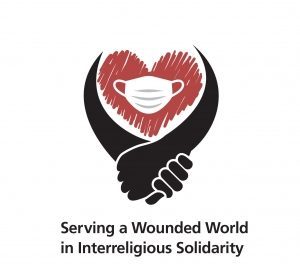PDF Serving a wounded world English
PDF Servir un monde blesse
PDF Serving a wounded world Portugese
PDF Al servicio de un mundo herido
PDF Dienst einer verwundeten welt
PDF Al servizio di un mondo sofferente
PDF Serving a wounded world - Chinese
Serving a Wounded World in Interreligious Solidarity
A Christian Call to Reflection and Action During COVID-19 and Beyond
27 August 2020
Excerpt
Current Crisis
The COVID-19 pandemic has had an impact on the global community with unavoidable immediacy and with little preparedness on our part. It has dramatically altered everyone’s daily life, and powerfully exposed the vulnerability that all humans share. Alongside the millions who have been infected physically, many more have been affected psychologically, economically, politically and religiously; all have been deprived of public worship. People have struggled to cope with death and grief, especially with the inability to be with their loved ones at their deathbeds, and perform their last rites and funerals in a dignified manner. The lockdown has brought the world economy to its knees, and global hunger could double due to this catastrophe. It has also contributed to an increase in domestic violence. The requirements of physical and social distancing have meant isolation for many people. Despair, anxiety and insecurity have come to dominate human lives. The coronavirus has affected all – rich and poor, the elderly and children, persons in cities and villages, farmers and industrialists, workers and students.
While the whole of humanity is gravely wounded, the pandemic has reminded us of the scandalous gap between the rich and the poor, between the privileged and the underprivileged. In many places, the sick, the elderly and the disabled have suffered most grievously, often with little or no medical care. It has exacerbated racial prejudices and led to increased violence against those who have for long been considered a threat to the dominant body politic that is structured and sustained by systems of inequality, exclusivism, discrimination and domination. People on the margins, especially migrants, refugees and prisoners, have been most affected by this pandemic.
The human misery associated with the COVID-19 pandemic is taking place amid the broader context of the suffering of this planet. Many have called on us to hear not only the voices of suffering humans but also the protracted cries of the earth and the entire community of life on it, which might be aggravated by the economic consequences of a post-COVID-19 world. We can also see this health crisis as a harbinger of future crises relating to climate change and the assault on biodiversity. We urgently need an ecological conversion of attitudes and actions to care more effectively for our world, paying attention to the groaning of the creation.
The heightened awareness of our shared vulnerability is a call to new forms of solidarity reaching across all boundaries. In this hour of crisis, we gratefully acknowledge the heroic service rendered by healthcare workers and all those who offer services, even risking their own health, irrespective of identity. We have also seen flourishing signs of people’s solidarity with the needy, manifested through volunteerism and charity. We rejoice that Christians, as well as people of all faiths and goodwill, are collaborating to construct a culture of compassion, reaching out to the needy and the vulnerable with material, psychological and spiritual assistance, at the individual as well as institutional levels. Because we are one human family, we are all related as brothers and sisters and are co-inhabitants of the earth, our common home. Our interdependence reminds us that no one can be saved on their own. This is a time for discovering new forms of solidarity for rethinking the post-COVID-19 world.
Because interreligious relationships can be a powerful means of expressing and building solidarity, and of opening ourselves to resources coming to us from beyond our limitations, we invite reflection on how we as Christians can become partners in solidarity with all people of faith and goodwill. In this journey towards solidarity, different communities are inspired and sustained by the hope we find in our respective traditions…
To download the entire document, click on the pdf link above.

